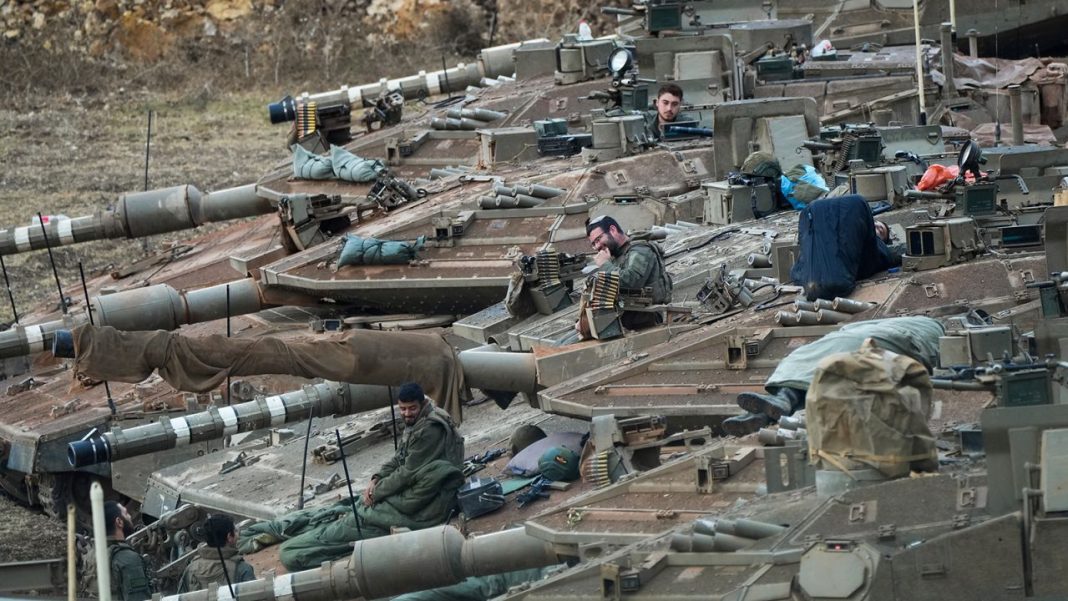“All Zionist claims that [Israeli] occupation forces have entered Lebanon are false,” Hezbollah media relations official Muhammad Afif told Al Jazeera.
He added there had “not yet been any direct ground clashes between [Hezbollah] resistance fighters and [Israeli] occupation forces.
“Our fighters are ready to confront enemy forces that dare or attempt to enter Lebanon,” he continued.
The Lebanese movement also announced it targeted Israel’s Glilot military base and Mossad headquarters in the outskirts of Tel Aviv with salvos of rockets.
Israeli reports said several settlers were injured in the rocket barrage from Lebanon on Tel Aviv.
The reports added the attack from Lebanon was “the largest” since the beginning of the war.
The United Nations peacekeeping force in Lebanon, UNIFIL, said on Tuesday the Israeli army had notified it of its intention to undertake what the Israelis have termed “limited ground incursions”.
It added that despite the developments in Lebanon, peacekeepers remained in position.
It reminded Israel that “Any crossing into Lebanon is in violation of Lebanese sovereignty and territorial integrity, and a violation of UN security council resolution 1701.”
“The price of continuing the current course of action is too high,” it said.
“Civilians must be protected, civilian infrastructure must not be targeted and International law must be respected,” it added.
The National News Agency in Lebanon reported that caretaker Prime Minister Najib Mikati has met with UN organisations and ambassadors of donor countries.
“We meet today at a time when Lebanon is facing one of the most dangerous stages in its history, as about one million of our people have been displaced due to the devastating war waged by Israel on Lebanon. We are working diligently in cooperation with the UN institutions to secure the basic needs of the displaced Lebanese, as we have done during all the difficult stages that Lebanon has gone through,” he said.
“We greatly appreciate the continued support provided by the UN, as well as the support of our sister Arab countries and other friendly countries. Today, we urgently appeal for more support to enhance our ongoing efforts to provide essential assistance to displaced civilians,” he added.
Lebanon’s army has also denied reports it had withdrawn from southern border positions by several kilometers following Israel’s ground incursion into the country.
Such reports were inaccurate, the Army Command said.
Since Sept. 23, Israel has launched massive airstrikes against what it calls Hezbollah targets across Lebanon, killing more than 1,000 people and injuring over 3,000 others, according to the Lebanese Health Ministry.
Several Hezbollah commanders have been killed in the Israeli raid, including Seyyed Hassan Nasrallah.
Hezbollah and Israel have been engaged in cross-border warfare since the start of Israel’s war on Gaza, which has killed nearly 41,600 people, mostly women and children, following a cross-border attack by the Palestinian group Hamas on Oct. 7 last year.
The international community has warned that Israeli attacks in Lebanon could escalate the Gaza conflict into a wider regional war.
Lebanon’s health system remains impacted and overstretched by a new escalation of violence in the country, the World Health Organisation has reported, warning that displaced people were at increased risk of diseases.
Liz Throssell, spokesperson for the UN rights office, has also warned against a “large-scale ground invasion” of Lebanon.
“With armed violence between Israel and Hezbollah boiling over, the consequences for civilians have already been terrible,” she told reporters in Geneva.
“We fear a large-scale ground invasion by Israel into Lebanon would only result in greater suffering,” Throssell said.
Before the ground assault, Israel’s escalating strikes on Lebanon reportedly killed more than 1,000 people in just two weeks, she added.
